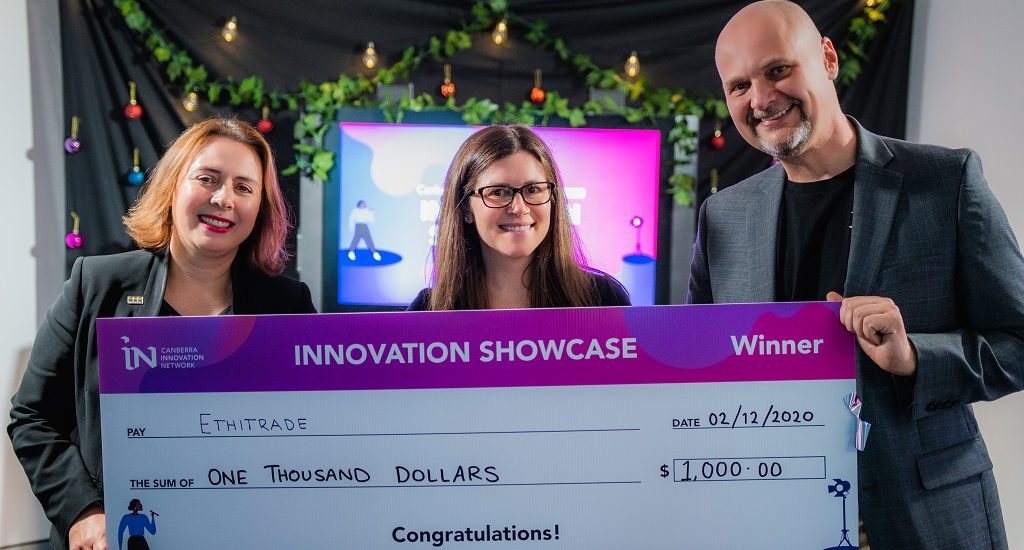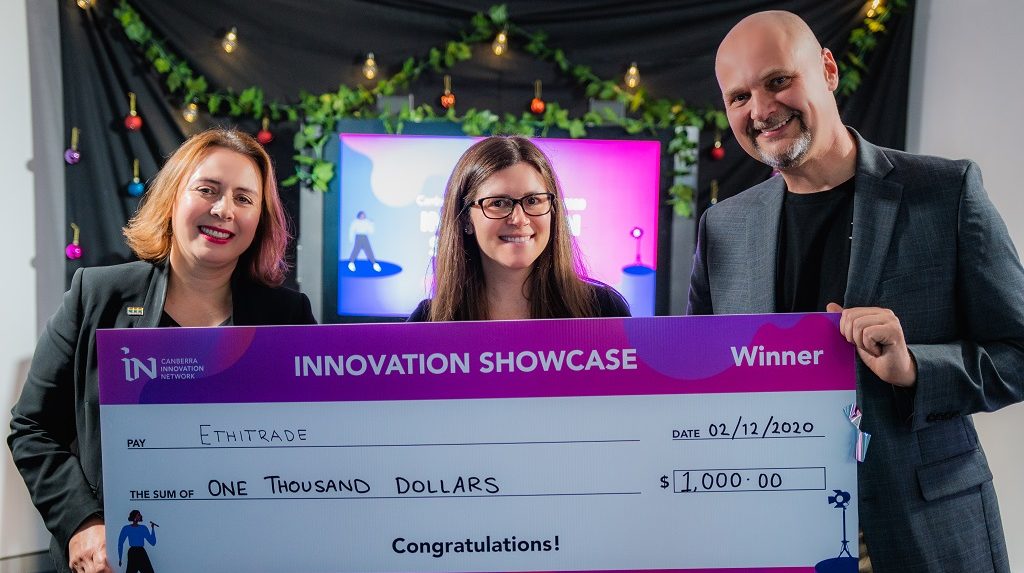- 19 October 2021
- Posted by: Canberra Innovation Network
- Categories: General News, Innovation Connect Grant, Weekly Innovation Challenge

As part of the Canberra Innovation Network’s commitment to supporting our community of entrepreneurs during the ACT lockdown, we’ve reinstated our popular Weekly Innovation Challenge. The Weekly Innovation Challenge is for every entrepreneur, founder and business leader. If you’re growing a business, developing a product or just want to change the world, our goal is to show you relevant new ideas and challenge you to rapidly try them out. We introduce a topic, host guest experts, allow room for questions and end by setting a useful, actionable challenge for you to work on.
In the eighth instalment of the Weekly Innovation Challenge we hosted three successful founders (and awesome people) who helped guide us toward funding prototypes. A big thank you to everyone who participated, and be sure to come back next Monday for our final challenge of this series: Set your Company up for Success.
NB: Below we share notes taken from the live meeting. This is not a transcript and these are not direct quotes; for those, refer to the video above.
Welcome to #8 of our Weekly Innovation Challenge series! These one-hour webinars are meant to help take you outside of your day-to-day while giving you some fresh thinking and support.
Today we’ll discuss prototype building and funding, and the ICON (Innovation Connect) grant. Each of our guests will start by telling you a bit about themselves, as well as one thing they’d do differently if they had the chance.
STEPHEN TROWELL: Background as a biochemist with the CSIRO, my big tip with hindsight is to break away with historical norms. I’ve stuck with features for too long and I’d be able to innovate better if I’d looked to new targets, new customers, new demands.
ZOE PIPER: Founder of Ethitrade, and it took me three goes to get ICON. So just don’t stop, and address the feedback you receive along the way.
ANDY MILLER: CEO and cofounder of Heaps Normal, changing drinking culture by brewing nonalcoholic beer. In hindsight, I wish we could’ve been even MORE brutally simple about the problem we solve. The tendency is to say “I’m doing this and this and this,” but if you can get your message down to just a few words, you’ll win. “Changing drinking culture” – boom boom boom, and it took us 12mo to get to that point.
“What words are unnecessary?” = a great first filter. “What’s the guts of this?” = a great second one. Finally? Be ambitious. If you’re not a little bit scared about how you’re defining your solution, you ought to be and keep striving for it.
What else helps? Workshops. Accelerators. Grant applications. All of those focus your idea.
And asking yourself WHY time and again. All these “why’s” distill the WHAT.
Instead of “what are we doing?”, “why does this matter?” brings forth a better end statement.
When testing a prototype, at early incubation stage, when do you start pitching it?
As early as possible. The sooner the better, when it comes to feedback. Also? Ideas are cheap and hardware is expensive, so “how are we going to get this made?” is the main question. Think about “what things have been done before, and what things do we need to demonstrate for the first time?” That’s going to set you up for your next round of user testing. Different grants and different times fund different stages of your product’s development.
You may not win the grant you’re after, but you will still come across the radar of someone on that panel that can help you make a connection, gain some exposure. That really happens!
Should we patent before applying for grants?
- Zoe: A patent is only as good as defending it, so you can go down the path of keeping it a trade secret.
- Stephen: It all depends. You need to look at every project on its own. Remember this – you put down a patent with your idea, so you then need to resource it (documentation, evidence, etc.). So it is often worth getting the grant first.
- Craig: 99% of granted patents are never commercialized. So you might want to test the commercialization potential first. And THEN get professional technical advice.
- Andy: It depends on your industry and your use case. And, is it a distraction or will it have a real impact on your ability to grow your business? In my case we thought it was a cost and distraction early on, so we didn’t want to be slowed down. Our success came by being quick and not focussing on a patent process.
Knowing what I want, and having funding to build it, is not the same as getting the THING. How do you find the resources to make your project happen?
- Andy: I don’t know how to brew beer! I probably could’ve come up with a company name and then went to the next step, then the next, but the key for me was finding the right cofounder. Rather than finding the right factory, look for like-minded people to join your team and fill the blind spots you have for your business. They’ll know the specifics! So grow your network – you don’t need to already know the person who can point you in the right direction.
- Zoe: We’ve used groups of developers all over the world, and tapped into talent pools where we’ve found them. Think of your minimum viable project first and you can always build bigger and up from there.
- Stephen: I’ve used my networks, and then those of my colleagues. Nothing has been in-house. Build trusting relationships with like-minded folks and you’ll be rewarded. If you’re patient! Offering people money doesn’t work. The people who GET what you’re on about will make it work.
What do you do when you learn you’ve received a grant?
- Andy: Celebrate! You’re on the right path. It should give you confidence. It can’t be underestimated the power of the belief and confidence you gain.
- Stephen: See above, but then, how can I MULTIPLY that money? Can I leverage it to become something bigger so I can do more? Success breeds success.
- Zoe: I was able to focus back on the start and enhance the user experience. And then mentioning the success in order to unlock other opportunities. Draw attention to your project by drawing attention to winning a grant. You’ll get media interest! Grants and awards write column inches.
What’s the biggest mistake you’ve made in this process?
- Stephen: I’m not sure yet! I’d do lots of things differently and waste a lot less time, but learnings are helpful.
- Zoe: Managing the timing of things, as they lined up next to COVID, was tricky. We had a commitment to deliver on, but then things came up that meant we couldn’t achieve our goals due to lockdowns. That whole process was a challenge. So stick to your principles when you can’t change anything else!
- Andy: One of the biggest traps I could’ve fallen down is the cofounder lottery. I won. It could’ve gone another way if my cofounder wasn’t awesome. You need to be able to spend every waking moment with this person, as problems will amplify ten-fold in the first year. And you need to be able to have difficult conversations about potential misalignments and structure; have those convos as early as possible.
Final thoughts?
- Zoe: Don’t stop! Take learnings and feedback onboard, and don’t be afraid about being early and dogged.
- Stephen: What Zoe said! Grit is vital. Look at what YOU are trying to achieve, and then look creatively at how you can make it happen.
- Andy: Do your research. Look up office hours and then spend 30min talking with someone who can then connect you with other people who can help you on your journey. And make use of the free outlets at your fingertips (like CBRIN!).
Week 8: If I’ve received a grant, how am I going to amplify it? If I’m looking for a grant, how am I going to get my application to the top of the pile (with the knowlege that ICON grants close in less than two weeks!)?
Week 7: Do I have the right mentors to bring my innovation to life? What do I hope to gain from each mentor relationship and how am I going to drive things in that direction?
Week 6: What’s something I can take away from this conversation and bring to my team? How can I better understand the humanity they bring to my organisation? Go back to your team, imagine Renee sitting next to you, and think about what you’d say or ask to make everyone feel safe, heard and understood?
Week 5: What can I do for my business to improve my money management? That might be downloading some software or having a convo with my accountant …
Week 4: Have a hard look at what you can offer a potential investor and decide if you’re ready, or need to do some more work first. Once you’re ready put together a dream list of a half-dozen investors and practice your pitch on a mirror and on your lockdown bubble.
Week 3: Sign up for one of the free trials mentioned above and test it out on your site. If you’re averse to that, identify a friend who isn’t familiar with your site and give them the five-second-challenge, then implement a change you learn is necessary from what they spot.
Week 2: Identify the ONE thing you can do better for your customers, and just bloody do it!
Week 1: Realise one problem I have and share it with someone I trust (“I’m not sure what to do about XYZ” or “I’m worried about ABC”). Saying it out loud is sometimes all I need to do! But other times the input from my team, a friend or another member of the innovation community with an understanding of my industry is just what I need to solve this.

